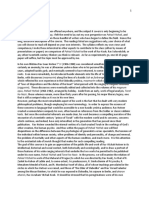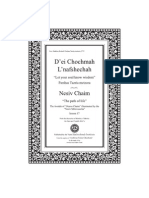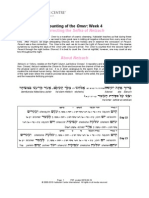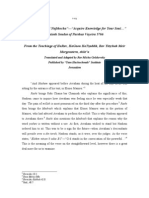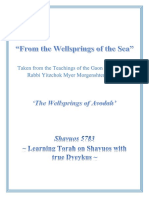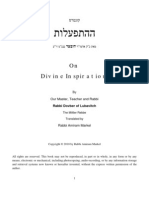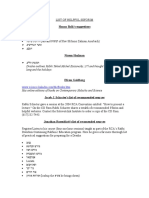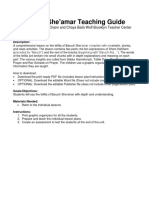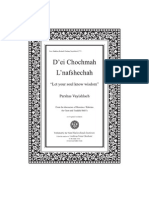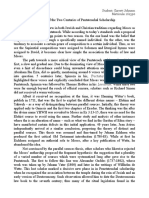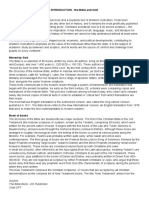The Holy Brothers
The Holy Brothers
Uploaded by
Sirius camCopyright:
Available Formats
The Holy Brothers
The Holy Brothers
Uploaded by
Sirius camOriginal Title
Copyright
Available Formats
Share this document
Did you find this document useful?
Is this content inappropriate?
Copyright:
Available Formats
The Holy Brothers
The Holy Brothers
Uploaded by
Sirius camCopyright:
Available Formats
The Holy Brothers
Reb Elimelekh of Lizhensk and Reb Zusha of Anipoli
The Holy Brothers.indd 1 12/5/18 5:25 PM
Simcha Raz
THE HOLY BROTHERS
Reb Elimelekh of Lizhensk
and Reb Zusha of Anipoli
The Lieberman Family Edition
Translated by
Dov Peretz Elkins
Menorah Books
The Holy Brothers.indd 3 12/5/18 5:25 PM
The Holy Brothers
Reb Elimelekh of Lizhensk and Reb Zusha of Anipoli
First English Edition, 2019
Menorah Books
An imprint of Koren Publishers Jerusalem Ltd.
POB 8531, New Milford, CT 06776-8531, USA
& POB 4044, Jerusalem 9104001, Israel
www.menorahbooks.com
Original Hebrew Edition © Simcha Raz, 2009
English Translation © Dov Peretz Elkins, 2019
The publication of this book was made possible through
the generous support of Beth Oloth Canada.
All rights reserved. No part of this publication may be reproduced,
stored in a retrieval system or transmitted in any form or by
any means, electronic, mechanical, photocopying, or otherwise,
without the prior permission of the publisher, except in the case
of brief quotations embedded in critical articles or reviews.
isbn 978-1-940516-84-4, hardcover
A cip catalogue record for this title is
available from the British Library
Printed and bound in the United States
The Holy Brothers.indd 4 12/5/18 5:25 PM
In memory of
Eliezer Lieberman, z”l
and his sons,
Aron Lieberman, z”l
Leibish Lieberman, z”l
Sam Lieberman, z”l
Born in Lizhensk, Poland, in the town of Reb Elimelekh,
our grandfather and fathers escaped the horrors of Europe through
Siberia and reached Montreal, Canada, where the family
settled and prospered.
They were dedicated in every way to their families, and their families
to them. They were renowned for their kindness, their commitment
to Torah and mitzvot, and their generosity to all who turned to them
for help and support.
The Holy Brothers.indd 5 12/5/18 5:25 PM
In honor of my beloved mother – Sora Eisenberg Landes
And my cherished sisters – Rena Landes Rank, Rebecca
Landes, and Tamar Landes
GREAT Jewish women all!
With love and pride,
Joshua H. Landes
The Holy Brothers.indd 6 12/5/18 5:25 PM
Contents
Foreword by Rabbi Hanoch Teller ix
Preface by the Translator xix
Introduction xxi
Awe of Heaven 1
Between Man and His Fellow Man 7
Confession 13
Dance and Joy 23
Exile 29
Hospitality 39
Humans and Their Creator 47
Humans and Their Limbs 53
Humility and Pride 55
Jewish Festivals 61
Kindness and Mercy 83
The Totality of the Jewish Nation 91
Qualities of Character 93
Mitzva and Transgression 99
vii
The Holy Brothers.indd 7 12/5/18 5:25 PM
Prayer 105
Rabbi and Student 111
The Scale of Merit 117
Service of the Creator 121
Soul 123
Spirituality and Physicality 125
Sustenance 131
Teshuva 135
This World and the Next 151
Thoughts and Reflections 171
Torah Study 173
Truth and Falsehood 181
Tzaddik 187
Tzedaka 193
Wealth 195
Man’s Inclinations 199
viii
The Holy Brothers.indd 8 12/5/18 5:25 PM
Foreword
Rabbi Hanoch Teller
A ccording to legend, the Baal Shem Tov, the founder of the
Hasidic Movement, was able to go to a specific spot in the forest, recite
a particular formula, and an angel appeared.
One generation later, they knew the exact spot where the Baal
Shem Tov was able to invoke the appearance of an angel, but they knew
not what to say, and an angel did not appear.
And one generation later, they were no longer certain as to the
precise spot that the Baal Shem would frequent.
And we, so many generations later and removed, we do not even
know where the forest is, let alone the formula that he would recite.
What do we have of the grandeur and majesty of the Baal Shem Tov?
We have a lot, for we have the story, and the story takes us back.
The stories of the holy brothers, Reb Elimelekh and Reb Zusha,
bring us back, back to a time where there was no pretentiousness or per-
sonal agendas – just a simple life where serving the Lord with simplicity
and sincerity was supreme, as was love of your fellow Jew – regardless
of his or her station in life or observance.
At the time of the holy brothers in the mid-eighteenth century,
the Jews in Poland worked for the unusually cruel feudal lords, each of
whom they referred to as the poritz. Invariably, the poritzes were inter-
ested in squeezing and extorting whatever money they could out of the
Jews, and mercilessly punished, with full government endorsement, any
delinquency in tax or rent.
ix
The Holy Brothers.indd 9 12/5/18 5:25 PM
The Holy Brothers
One of the many Jews who had incurred the wrath of his poritz had
an outstanding debt of three thousand golden coins. It was off to prison for
him, and the poritz made it very clear that the inmate would never see the
light of day again until his debt was fully repaid, and this was not a vain threat.
Kindhearted and benevolent, Reb Eliezer Lipman learned of this
poor soul’s plight and sought to redeem him from captivity. It would be
an august challenge, for he had only a thousand golden coins. Still, he
did not falter in his quest and went to speak with the poritz.
As he was making his way to the poritz’s doorstep he heard tor-
turous moans, which he gathered were from the Jewish prisoner held in
the mansion’s dungeon. Those awful moans only further strengthened
Reb Eliezer’s resolve.
The visitor was ushered into the home of the poritz, who was
cordial until he learned the purpose of the call. Any trace of geniality
evaporated at the very mention of the prisoner. “The stinking Jew owes
me three thousand golden coins,” the poritz fumed, “for all of the time
that he hasn’t paid his debts. He will rot in the cell to the last of his days
until every coin is received!”
Reb Eliezer attempted to reason with the coldhearted land owner.
“What have you to gain from a tenant who dies in jail? You are after your
money, and this will not return it. Let me pay you all the money that
I have, a thousand golden coins, for the freedom of the detainee, and
surely the Lord will bless you so that you will not lose out from this deal.”
But the poritz would not budge. However, Reb Eliezer also would
not give up. Finally, the determined philanthropist prevailed, and the
inmate was released.
The poritz was impressed both by Reb Eliezer’s negotiations, and
that a perfect stranger would spend a thousand coins of his own money
to redeem a fellow Jew. “I see that you are an upright man,” the poritz
commented, “and I am therefore going to offer you a break. Since you
are a flax merchant, I recommend that you travel to my brother-in-law,
who is a flax distributor. I will write you a letter of recommendation
encouraging him to give you a substantial discount.”
“Thank you,” Reb Eliezer responded softly, “but I parted with my
last coin in order to redeem your captive.”
The Holy Brothers.indd 10 12/5/18 5:25 PM
Foreword
“In that case,” reflected the poritz, “here is your money back; invest
it wisely with my brother-in-law!”
Joyously, Reb Eliezer departed to the flax distributor armed with
his letter of recommendation. The new poritz read the letter and was
amenable to make a sale at a fair price. He had Reb Eliezer escorted to
his warehouse where he could personally inspect the low-cost, quality
material.
Just as they were leaving the warehouse, Reb Eliezer heard a
tormented shriek from somewhere nearby. “What is that noise?” he
wanted to know.
“Oh that,” the worker said with a flip of his hand. “It’s hard to
believe that old Jewish farmhand is still alive. Ever since he was impris-
oned he has made such a racket that we have denied him food and drink
to quiet him down. Eventually, I guess, it will work…”
Upon hearing this, Reb Eliezer dropped the flax in his hands and
rushed out of the warehouse to speak with the man he had just negoti-
ated with. Using the money that he had brought for his purchase, Eliezer
Lipman managed to redeem the prisoner.
The captive was released in a dreadful state and Reb Eliezer had
a doctor summoned and food gingerly administered. He then invited
the man to come to his house for the holiday of Passover that was
approaching.
Grateful that he had managed to save a fellow Jew before it was too
late, Eliezer and his guest were about to set off when the wholesaler called
out, “Hey, what about our deal? Don’t you wish to purchase some flax?”
“How could I ever do business with a man as wicked as you?” Reb
Eliezer declared. “Have you no compassion or human dignity?”
Most amazingly, this poritz was visibly moved by the reproof. Filled
with contrition, he pledged that from that day forward he would never
commit a shameful act, and to prove his intentions he reduced his price
even more and put the money for the ransom toward the flax purchase.
Eliezer Lipman was amazed how things had developed. It was
exactly as the Rabbis had taught: one mitzva brings in its train another
mitzva! Both ransoms did not cost him, fulfilling the rabbinic teaching
that no action or mitzva ever goes unrewarded.
xi
The Holy Brothers.indd 11 12/5/18 5:25 PM
The Holy Brothers
But what greater reward could Eliezer have received for his
constant kindness and charity than a beautiful family, two of his sons
being none other than Reb Elimelekh of Lizhensk and Reb Zusha
of Anipoli?
The parents of the holy brothers, as they came to be known,
Eliezer Lipman and his pious wife Mirish, were descended from families
that could trace their lineage all the way back to Rashi, Rav Yochanan
HaSandlar of talmudic fame, and even King David. They lived in the
townlet of Lapachi, not far from Tiktin.
As Mirish was illiterate in the Holy Tongue, she would recite her
blessings by heart. Reb Zusha testified that at the time that his mother
prayed, the Divine Presence could be found in the home. Every Friday
before Sabbath she would travel to Tiktin to dispense alms.
The day that the Baal Shem Tov visited Eliezer and Mirish’s vil-
lage marked a turning point in their lives. From then on, they faithfully
provided candles to the synagogue, and were meticulous in prayer as
they beseeched the Almighty to open the hearts of their four sons and
one daughter to the Torah.
After the passing of Eliezer Lipman, his sons divided their father’s
inheritance in the following manner: Avraham received the cash and
the house was given to Nosson. The jewelry and housewares went to
Elimelekh and the outstanding debts were to be collected by Zusha.
The division had been contrived by Zusha, who was clever at dis-
guising his intentions. He made it appear that he had time on his hands,
and accordingly, was the most suited for this least desirous of portions:
the collection of debts.
However, Zusha was in no way cut out for this mission, and with-
out a penny from the inheritance was left destitute. Bereft of any means
of support, he decided to travel to his uncle who was an assistant to the
holy Maggid of Mezritch, the successor of the Baal Shem Tov.
Lodging with his uncle meant constant exposure to the Mag-
gid, and in no time, Zusha became an ardent Hasid. In the meantime,
Elimelekh had moved to his wife’s hometown of Shineva.
After his stay with his uncle in Mezritch, Zusha departed for the
home of his brother Elimelekh. The very long and arduous journey took
xii
The Holy Brothers.indd 12 12/5/18 5:25 PM
Foreword
its toll on Zusha’s attire. His worn-out tatters were far shabbier than those
that clad the poorest beggars.
Ever vigilant of the honor of his in-laws, Elimelekh was ashamed
to allow his dreadfully appearing brother into his home. He therefore
arranged accommodations for him at the home of the local baker.
However, Zusha’s nights were not earmarked for mundane sleep.
Those precious hours were devoted to learning, prayer and the loud reci-
tation of tikkun ĥatzot. Zusha’s nocturnal agenda effectively brought an
end to his tenancy at the baker’s house, and Elimelekh had no recourse
other than to invite his brother into his own home.
It was there that he was able to observe Zusha’s ways firsthand, which
awakened in him a desire to draw close to the Maggid of Mezritch. Reb
Zusha also convinced his older brother to join him in a self-imposed exile
which they would devote to elevating the people that they would encounter.
Attired in the clothes of exile, they would travel from village to
village to persuade, direct, and inspire the people to desist from sin and
return to their holy roots. The exile would also, as the Talmud teaches,
purify their souls.
And indeed, across the length and breadth of the Polish land-
scape the brothers wandered, bringing the word of the Lord to those
that were either unfamiliar or needed to be reminded. The holy broth-
ers, in a manner all their own, made focusing upon God a central part
of people’s lives.
Wherever the two holy brothers went during their self-imposed
exile they generated a spirit of repentance. Their standard routine was
to admonish themselves out loud for their supposed crimes, when in
fact their “sins” were precisely the ones that the villager within earshot
needed to rectify.
“Melekh, Melekh,” Reb Elimelekh would reprimand himself, “how
will you ever be able to face your final judgment knowing that you took
advantage of your customers’ naiveté?”
“I am certainly no better,” Reb Zusha would add. “How could I
have avoided davening with a minyan?” he mourned.
The two of them used their clairvoyant abilities to determine
exactly what it was that the locals had transgressed, and then elaborated
xiii
The Holy Brothers.indd 13 12/5/18 5:25 PM
The Holy Brothers
as to how they would personally be punished for those very same sins.
Invariably, this caused the true sinners to be filled with remorse and rec-
tify their sinful deeds. Countless individuals improved their lives this
way without having their dignity compromised or having been humili-
ated in the process.
Wandering from town to village, the holy brothers neglected their
physical needs and were sustained solely by meager coins or scraps of
food that were donated along the way. One Sunday night they found
themselves in a new town on a cold, wintry night. The tavern keeper
offered to lodge them behind the fireplace that heated the pub.
The two of them took their places on the floor, with Reb Zusha,
as always, offering his older brother the preferred spot nearer the fire.
No sooner had Reb Elimelekh and Reb Zusha settled down to rest their
weary bones when the tavern began to fill up with locals who had come
to celebrate nothing more than their inebriated state. Wobbling and sing-
ing as drunkards do, they made themselves merry until they stumbled
across a real cause for celebration.
Right before their eyes, innocently sleeping on the floor, was a
Jew who could serve as the evening’s entertainment. As many of them
were wagon drivers, they were equipped with whips and staffs that could
readily enlist the sleeping Jew’s cooperation.
“Up and dance!” they ordered, snapping their whips and beating
their staffs to ensure immediate compliance. Reb Zusha sprang to his feet
and danced energetically for the leering drunkards. The wagon drivers
were not looking for a quick performance – they had all night – and they
unsparingly utilized their appurtenances to assure protracted amusement.
Eventually, however, they grew tired and allowed Zusha to col-
lapse on the floor. But it wasn’t just one Jew that they had savagely beaten.
Reb Elimelekh felt every blow on his own back and urgently pressed his
brother to exchange places with him. “They’ll be back and then it will
be my turn to suffer their indignities.”
But in no way did Reb Zusha feel that he was getting the worst
of the deal. Being beaten simply because he was a defenseless Jew was
good for the soul, he maintained. And he knew his brother did not dis-
pute this point.
xiv
The Holy Brothers.indd 14 12/5/18 5:25 PM
Foreword
Still, Reb Elimelekh would have none of it. He was insistent that
they switch places so that if the drunks decided again to be entertained,
he would bear the brunt of their vile behavior.
And indeed the wagon drivers returned, eager for another dance
performance. Not for naught had they entered the tavern.
But in a display of uncharacteristic egalitarianism, they announced
that it would only be fair to wake the Jew lying nearer to the fireplace, for
the outer one had already made his contribution to the night’s festivities.
Reb Elimelekh stood up and explained, or at least tried to explain,
that the outer Jew was previously the inner one, for they had switched
places. But his entreaties fell upon drunken ears.
Reb Zusha sanguinely accepted his lot and commented, “Melekh,
don’t feel bad. You see that one who deserves to be beaten cannot avoid
it. Your desire to switch places was willed from Heaven.”
Eventually the wagon drivers tired of their entertainment and
they crashed to the floor in a drunken stupor. The brothers arose to
recite tikkun ĥatzot and to thank the Almighty for having separated them
from inhumane derelicts. Blessed were they to be servants privileged to
worship the Almighty.
The holy brothers never forgot those that extended themselves
on their behalf in their period of exile. One such individual was Reb
Aharon in the village of Ludmir, who served as their host whenever
they visited the town. Reb Aharon lived in abject poverty, but this
never stopped him from extending hospitality and sharing his mea-
ger crumbs.
Once Reb Elimelekh and Reb Zusha were revealed as famous
tzaddikim, and their followers were everywhere to be found, they
returned to Ludmir – this time in a horse-drawn carriage. Just as in
the past, they turned to Reb Aharon for lodging, which he graciously
offered, as always.
Overnight, Reb Aharon’s modest hovel became the focus of the
town, and masses formed outside the door to seek the tzaddikim’s bless-
ings and intervention in a host of matters.
One of the wealthy merchants in the town felt that he deserved
the honor of hosting these famous guests, and he extended his invitation
xv
The Holy Brothers.indd 15 12/5/18 5:25 PM
The Holy Brothers
for them to come to his richly appointed house where they could dwell
in perfect comfort. But the brothers flatly refused.
“What is the difference between our visit this time,” the brothers
wanted to know, “and our earlier visits, when you did not extend us an
invitation? We are the very same people; just this time we came with a
horse and wagon.
“We therefore propose that you host the horse and wagon…”
In the court of the Maggid, Reb Elimelekh was considered one of
the finest students. And when the great Maggid’s soul was summoned
above, the disciples gathered to decide upon his successor. The consen-
sus was that there was a need for a leader that was robust and energetic,
articulate and charismatic, who would know how to watch over his flock
and even, if necessary, engage in battle on behalf of the Hasidic Move-
ment. Once these guidelines were established, the question of who
would succeed became a moot one.
Unanimously the disciples elected to crown Reb Elimelekh with
the mantle of leadership to direct and spread Ĥasidut in Poland and Gali-
cia. Upon reaching their decision they chanted in unison, “Yeĥi adonenu
v’rabbenu – Long live our master and teacher, Reb Elimelekh!”
From there the group of Hasidim departed to Lizhensk with
Reb Elimelekh at the head of the procession. The group continued
until evening descended and it was necessary to lodge for the night.
They entered an inn along the way and requested a single room for their
newly appointed master.
To the great astonishment of the Hasidim, Reb Elimelekh
requested pillows and covers from the innkeeper – as if he were plan-
ning to retire for the entire night. Several hours later the Hasidim were,
well, appalled that their new master was still sleeping like a commoner.
The Maggid who had preceded him had never allowed himself more
than a few hours of sleep. Without anyone saying a word, there was a
profound sense of regret over their choice of leader. Still, no one had
the temerity to arouse Reb Elimelekh.
But when several more hours passed and Reb Elimelekh remained
sleeping, they knew they had to do something. They summoned Reb
Zusha, who was with them at the inn, to awaken his brother.
xvi
The Holy Brothers.indd 16 12/5/18 5:25 PM
Foreword
“Waking Reb Elimelekh is the simplest thing in the world,” he
commented, as if he was just asked by the trembling Hasidim to tie a
shoe. And with that he entered the room where his brother was sleep-
ing and placed his hand over the mezuza in the room. At that instant
Reb Elimelekh jumped out of bed.
The confounded Hasidim asked Reb Zusha to explain what they
had just beheld. “As you know,” Reb Zusha began, “man must envision
the name of God before his eyes at all times. But what is one to do
when he slumbers? The answer is that he relies on the ineffable name
inscribed in the mezuza.
“Thus, when I covered over the mezuza, my brother no longer had
anything to rely on, and was therefore compelled to awake and envision
the Almighty before his eyes.”
All of the Hasidim released a pent-up, collective sigh of relief.
With Reb Elimelekh at the helm, Lizhensk became the Jerusalem of
Hasidim.
One of the great hasidic masters, the Divrei Chaim, commented,
“Anyone who believes all the hasidic stories is a fool, and anyone who
thinks that any of the stories could not have happened is a heretic.”
Perhaps we can append this caveat to mean all hasidic stories are
true, just not always religious about fact. They are imbued with mul-
tiple layers of meanings and implications in the subtle twists and turns
of the telling. The stories of the holy brothers, just like the story about
the Baal Shem Tov, will transport us back to the magical places of yore,
to the peaks of the Galician Carpathians and to the depths of our hearts.
Hanoch Teller
Jerusalem
xvii
The Holy Brothers.indd 17 12/5/18 5:25 PM
Preface by the Translator
I am delighted and honored to have a part in bringing this book
to the English-reading world.
First because of my deep respect and admiration for my friend
and teacher, Simcha Raz, a distinguished Israeli scholar and writer. This
is the sixth book I have been privileged to have published in English
which was written originally in Hebrew by Simcha Raz. All six books
are the product of Simcha Raz’s lifelong study of the sacred literature
of the Jewish people.
Simcha Raz has the unique ability to gather profound teachings
from many places and deposit the sweetness and beauty of Jewish wis-
dom into a series of outstanding collections on many themes.
I particularly enjoyed translating this collection of tales of the holy
brothers Reb Zusha of Anipoli and Reb Elimelekh of Lizhensk. The stories
reflect the powerful personalities of two of the best-known hasidic masters,
and the deep moral and spiritual heritage which they have bequeathed
to future generations. Reb Zusha’s exemplary devotion to God and Reb
Elimelekh’s profound study of Torah and deep connection to the life of a
Hasid make them models for the Jewish people of this century.
xix
The Holy Brothers.indd 19 12/5/18 5:25 PM
The Holy Brothers
I want to thank those who assisted in making this translation
smooth and accurate: Yocheved Klausner and Sahar Tzur. Yocheved’s
amazing mastery of both Hebrew and English is a special gift that she
shared with me. And Sahar’s special knowledge of the art of translating
is another amazing gift. Profound thanks to both of them.
I am extremely grateful to my cherished friend, Joshua Landes,
a devoted Jew and lover of Hasidism, who encouraged and supported
the translation of this special collection. Most appropriately, he has
dedicated this book in honor of his beloved mother and sisters.
I am also truly grateful to the Lieberman family of Montreal,
Canada, who supported the publication of this book. The Lieberman
family are an outstanding example to all in their support for Torah
institutions and scholarship, and it is especially meaningful that they
have dedicated this book in memory of their grandfather and fathers,
all born in Lizhensk.
I am also grateful to Ashirah Yosefah, of Koren Publishers Jerusa-
lem, for guiding my book from manuscript to press, to Aryeh Grossman
of Koren Publishers for his valued assistance in enabling this project to
become a reality, and to Esther Cameron and Debbie Ismailoff, whose
superb editing is deeply appreciated.
In closing I want to thank my devoted wife, Maxine (Miryam),
who tolerated my obsession with the computer during our first years
after making aliya. Working on editing and translating this amazing book
has brought me great joy and renewed appreciation of the Jewish tradi-
tion to which we have together devoted our lives.
Rabbi Dov Peretz Elkins
The Holy City of Jerusalem
Rosh Ĥodesh Shevat 5778
xx
The Holy Brothers.indd 20 12/5/18 5:25 PM
Introduction
Reb Zusha OF ANIPOLI
Reb Zusha (1718–1800), son of Rabbi Eliezer Lipman of Lizhensk, was
the essence of piety, simple faith, and pure, genuine love of Jews. He was
the authentic symbol of the image of the tzaddik of former times, who
had boundless love for his Creator, the Torah, and the Jewish people.
Reb Zusha’s learning came second to his deep piety. “Being naive
is a sign of great wisdom,” said Rabbi Naftali Tzvi of Ropshitz. Our father
Yaakov was “a mild man who stayed in camp,”1 but not out of naïveté. He
met challenges with Lavan and with Esau. He was wise in his simplicity,
and Reb Zusha, too, was simple out of choice.
In the city of Anipoli, the last city where Rabbi Dov Ber, the great
Maggid of Mezritch, lived, Reb Zusha guided the Hasidim and merited
to be buried next to the grave of this illustrious leader of the hasidic
movement. He served him in life and served him in death.
When Rabbi Shneur Zalman of Liadi published his famous work,
the Tanya, the foundational book of hasidic philosophy, he did not seek
approbations from the great scholars of Israel. The approbations of
Reb Zusha and his colleague Rabbi Yehudah Leib HaKohen of Anipoli,
author of Or HaGanuz, were all he sought.
1. Gen. 25:27.
xxi
The Holy Brothers.indd 21 12/5/18 5:25 PM
The Holy Brothers
Rabbi Shneur Zalman testified to the godliness of Reb Zusha:
“His prayers were filled with extreme awe, so that in the ‘Temple of Awe’
his awe was amazing.” When Reb Zusha lay ill in his last years and was
confined to his sickbed, Rabbi Shneur Zalman made a special trip to
Anipoli to serve him.
Reb Zusha entered the garden of Ĥasidut before his brother Reb
Elimelekh. When Reb Elimelekh still opposed the new trend, Reb Zusha
was already learning from the Maggid of Mezritch. Zusha worked on his
brother, exposing him to all kinds of teachings, lessons, stories, and wise
insights, until he brought his mind and heart into the new movement.
And thus Elimelekh became a rabbi, rose to the level of master and guide
to generations, and established his own beit midrash. He holds a place of
honor even today as a spiritual guide to the Hasidism of Poland and Gali-
cia, while the image of Zusha the wanderer persists to this day.
Zusha always remained Zusha – a simple, honest Jew, never
touched by a drop of arrogance or egotism. Reb Zusha never created a
congregation, never aspired to greatness or glory, to heroism or royalty.
He had but one desire: to be Zusha. What benefit would it serve, he
taught, were I to exchange places with our father Avraham? Avraham
would be Zusha, and what benefit would come to the world?
Reb Zusha was completely wrapped in ecstasy. The kindling oil of
enthusiasm never left him for even a moment. His soul longed endlessly for
the greatness of God. He was totally at one with the essence of his Creator.
Reb Zusha had no special approach to Torah study, to Hasidism.
He had no secret knowledge; he asked few questions. Nor was he a scholar
or one who led followers to ways of faith. In his core he was a simple,
honest Jew, a hidden tzaddik, who stands in the corner and prays quietly.
One hardly notices him or pays him special attention. But by dint of the
purity of his prayers, free of any cunning or biases, all the prayers in the
beit midrash found their way to Heaven.
Reb Zusha was well known as a symbol of the movement of those
who were pious, God-fearing, and pure, who sought nothing for themselves –
neither lucre nor glory, not pleasure in this world or the next. He was simply
pure. He fitted the definition of the upright delineated by Eliezer Steinman,
the great scholar of Hasidism in this generation. Steinman writes:
xxii
The Holy Brothers.indd 22 12/5/18 5:25 PM
Introduction
One who is upright is always upright, totally honest. He is com-
pletely upright. No one is more upright than such a one. The
upright person needs not a speck of guile. He is pure and inno-
cent. His uprightness is limitless. Thus he is completely fit and
honest. He is honest because there are no detours on the ladder
toward heaven, and no slipperiness on the slope downwards.
You might say: An upright person has no depth. Not so! He
is deeper than the deepest. A deep person must delve rigorously
to reach the depths. But the upright one reaches the depths even
on the surface. The upright one does not have to be a scholar. He
recites “Blessed are You” and has already reached the depths. He
takes a piece of chalk in his hand, or a flower, or a crumb of bread,
and behold, he has already attained the whole world. The upright
one is always able to transmute a little into a lot. The upright one is
righteous. The upright one always stands on the edge of the abyss,
but holiness protects him; “God protects the upright.”
Reb Zusha is that upright person. Others reached great
heights, penned holy books, left behind important Torah inter-
pretations, and he is just Reb Zusha. But when one pronounces
the name of Reb Zusha, it has a powerfully strong and majestic
sound. Reb Zusha’s name means something.
The upright person is not the opposite of the scholar.
On the contrary, he is an absolute scholar. And he is not a close
neighbor to the one “who doesn’t know how to ask.” With him,
he doesn’t know how to get angry, or become embittered. In any
case the upright one is not gratuitously contentious, he is not
one who starts an argument about the order of the universe, or
about the nature of creation, or who strives to solve problems
and explain riddles. Since he has no arguments, he needs no
answers.
The upright one is righteous, in other words, complete. He
finds completeness everywhere. With an open heart he is assured
in his heart, in his soul, in his blood, in all his limbs, that what-
ever the Creator made, He made it well and at the proper time.
It is obvious that the upright one sees no evil. There is no such
xxiii
The Holy Brothers.indd 23 12/5/18 5:25 PM
The Holy Brothers
thing as evil. Goodness means absolute simplicity, even though
it brings nothing new. He is simply good from birth.
The world of the righteous one is an endless song, a thread
of grace and harmony covers it completely. This is not a matter
of special intelligence, in the realm of wisdom or at the edge of
wisdom. The righteous one is complete in his soul, and since
completeness and a greeting of peace2 is in his very bones he
shares greetings with everyone. Every morning he says, as does
Zusha: “Good morning to you, O world!” Even to the morning
itself he says: “Good morning to you, O morning.” The soul of the
righteous does not break. It comes from the source of the souls
which fled before the eating of the Tree of Knowledge, prior to
shevirat hakelim (the “breaking of the vessels”).3
REB ELIMELEKH OF LIZHENSK
Reb Elimelekh (1717–1787), also the son of Eliezer Lipman of Lizhensk,
was one of the most important leaders of the hasidic movement.
In his youth he took on the burden of exile and accepted great
agony and suffering. Under the influence of his brother Reb Zusha, he
embraced Hasidism. He visited the Maggid, Rabbi Dov Ber of Mezritch,
and became one of his disciples.
Following the death of Rabbi Dov Ber, Reb Elimelekh traveled
to Lizhensk and began to spread the light of Hasidism in Galicia and
in Poland. As a leader he acquired for himself such a central position
in Hasidism that he was compared to the revered Baal Shem Tov (the
Besht).
Reb Elimelekh merited, appropriately, the appellation of “founder
of practical Hasidism.”
In accordance with the needs of the time, Reb Elimelekh equated
the practical form of Hasidism with the deep, theoretical philosophy of
the Maggid of Mezritch on the subject of the tzaddik and his qualities.
The tzaddik, in the view of Reb Elimelekh, is holy at birth, just as an
2. This is a play on words: “shalem,” meaning whole, complete, and “shalom,” the ev-
eryday greeting, which means “peace.”
3. Sha’ar HaĤasidut, Hotzaat Neuman, Tel Aviv, 317.
xxiv
The Holy Brothers.indd 24 12/5/18 5:25 PM
Introduction
oldest child is holy from his mother’s womb, and he is considered a son
of the Blessed Holy One.
Before aligning himself with the hasidic movement, Reb
Elimelekh was a kabbalist who practiced asceticism in his life. Despite
the fact that one of the characteristics of Hasidism is that it does not
reject worldly matters, there are clear indications that Reb Elimelekh
continued to cling to his former ideas.
The Baal Shem Tov was the architect of Hasidism. In his shelter
Rabbi Yaakov Yosef of Polnoye and Rabbi Dov Ber of Mezritch estab-
lished their home and the home of their loyal students, but this meet-
ing place for scholars and aspiring tzaddikim became a firm and faithful
home only once Reb Elimelekh set in it a table for guests from the class
of simple folk. He made Hasidism an inn for the masses, a house for the
people. The Baal Shem Tov set up an “Ohel Moed,”4 his students turned it
into a tabernacle, and Reb Elimelekh built a small sanctuary, since it was
he who established the table, which was the foundation for the spread
of Hasidism and the leadership of the community.
Since Reb Elimelekh gave Hasidism its final form, refined it, and
emphasized the importance of the great tzaddik on whom the whole
world relies, he made it a useful, sought-after tool for the masses. Some
people revered him as much as they revered the Baal Shem Tov, as if
the hasidic movement had two ĥatanei Torah or two ĥatanei Bereshit
standing under one ĥuppa. However, it is not appropriate to compare
souls with weights and measures like things of this world. Every excep-
tional person is unique.
The Besht occupies a special place of honor. He is almost not in
the category of flesh and blood. He is a spark from the world of legend.
He is a messenger of divine providence who was sent to the people
at a time of turmoil to extricate them from a mire of decadence and
depression of the soul. He is a kind of heavenly voice from the soul of
the nation, emerging to awaken and encourage. But Reb Elimelekh is
not superhuman, nor is he a genius. He is a simple Jew who rose from
the simple people to become a leader of the community, and this is
the source of his great strength and special merit.
4. The Tent of Meeting in the Bible.
xxv
The Holy Brothers.indd 25 12/5/18 5:25 PM
The Holy Brothers
Reb Elimelekh emphasized especially the spiritual exile, since he
knew that the Shekhina (Divine Presence) is with us in exile. Thus “one
must meditate alone before the sun rises, when it is a favorable hour to
weep over the exile of the Shekhina until there are no more tears.” It is
a clear sign that a person repents “when one weeps over the exile of the
Shekhina,” since “in this way one will know if he is on the true path in his
service of the Blessed One, when he says that he worries and is pained
constantly about the exile of the Shekhina and the people of Israel.”
Like the rest of the leaders of Hasidism, Reb Elimelekh empha-
sized the importance of joy in divine service, and along with this he
had an essential understanding of the need for a measure of seriousness,
which, according to what is written about him, also existed in his life.
• • •
Reb Elimelekh’s book, Noam Elimelekh, published in Lemberg in 1787,
quickly became an important guidebook for Hasidim and was reprinted
many times. Rabbi Mendel of Rimanov, the great Admor5 of Galicia, said,
“Only after my immersion in the mikve, on Erev Shabbat, can I plumb
the depths of Noam Elimelekh.”
Written as a commentary on the Torah, Noam Elimelekh contains
much material detailing the ideology and way of life of Hasidism. Reb
Elimelekh highlights the idea of the tzaddik. He stresses the role of the
rebbe as the source of understanding, as a highly evolved human who
lives on a lofty plane, and who is the bridge between God and man.
In most editions there is a list of hanhagot (religious practices) which
Hasidim of all streams try to apply.
Noam Elimelekh is one of the most important foundational books
of Hasidism, and it became a sacred volume. Many considered this book
as a remedy and placed it at the head of those who were ill or giving birth.
As we already mentioned, Reb Elimelekh came to Hasidism not
on his own, but rather under the influence of his brother Reb Zusha.
Nevertheless, he eventually reached very high levels of understanding of
5. This is the Hebrew acronym for Adonenu, Morenu, VeRabbenu (our lord, our teacher,
and our master).
xxvi
The Holy Brothers.indd 26 12/5/18 5:25 PM
Introduction
Hasidism and became a teacher of its precepts. Even the giants among
the rebbes sang the praises of his book, which to this day is considered
a major resource, similar to Toldot Yaakov Yosef. Since its publication
there has not been another book written on the philosophy of Hasidism
equal to it. It is filled with the light of redemption, freeing man from the
vain pleasures, pain, and sickness of this world. Yet Reb Elimelekh him-
self, in contrast to the rest of the great scholars of Hasidism, and even
in contrast to his brother Reb Zusha, was not redeemed.
• • •
Reb Elimelekh of Lizhensk was only seventeen years old at the beginning
of the Baal Shem Tov’s leadership and about forty when the Baal Shem
Tov died. Had he wanted to, he could have established a connection
with him lasting many years, until the latter’s death. But Reb Elimelekh
chose not to do so, because he did not approve of the appellation “Baal
Shem (Master of the Name), as magic makers and those who dealt with
oaths and holy names – methods that the holy Ari already considered
to be dangerous and outdated – were referred to by this title. Only after
Reb Elimelekh recognized the holiness and purity of the Baal Shem Tov
and it was clear to him that the title Baal Shem had no connection to the
Baal Shem Tov did he join his camp. Since at that point the Baal Shem
was no longer alive, Reb Elimelekh accepted the authority of his student,
Rabbi Dov Ber, and attained an important position among his followers.
Following Reb Elimelekh were his superb students: Rabbi Yisrael
of Kozhnitz, who was dubbed “the second Baal Shem Tov”; Rabbi Yaa-
kov Yitzĥak Horowitz, the Seer of Lublin; Rabbi Mendel of Rimanov;
and Rabbi Avraham Yehoshua Heschel of Apta. All of these individu-
als were considered by the Hasidim as the major followers and spiritual
heirs of Reb Elimelekh of Lizhensk.
• • •
Compared to all the other great teachers of Hasidism, who were men of
esoteric knowledge, Reb Elimelekh’s teachings were the most open. It
is easier for us to grasp his spirit, to identify with his struggles, to dwell
xxvii
The Holy Brothers.indd 27 12/5/18 5:25 PM
The Holy Brothers
in his proximity and hear from him both new insights into Torah and
stories about life and its complications.
Just as the Maggid of Mezritch built his hasidic philosophy on the
foundation of the ideas of the Besht, so too did Reb Elimelekh design
his beit midrash with the concepts that he imbibed from the Baal Shem
Tov’s teachings. The Maggid was like a father and patron for his students,
and so was Reb Elimelekh. They were similar in their ideas, but differ-
ent in their actions, of one mind in thought, but different in goals and
aspirations. The Maggid was a teacher to students, while Reb Elimelekh
was a teacher to rebbes. The Maggid taught the philosophy of Hasidism,
while Reb Elimelekh was a guide to the hasidic path.
• • •
Hasidic literature, whose existence spans two hundred years, is surprising
in several ways, not only in its volume. It stands out in the multiplicity
of its subject matter and its creativity. It includes volumes of philoso-
phy and ideology, commentaries on the Torah, and expository essays
on rabbinic literature. It also includes sermons, homilies, reprimands,
discussions and parables, wills, and stories and legends.
Now The Holy Brothers joins this growing body of literature. Its objec-
tive is to create a window through which the reader can view the essence of
his own life, and, in the words of the founder of the hasidic movement, Rabbi
Yisrael Baal Shem Tov, “to affix a mezuza on the gates of the universe, to pre-
vent evildoers from entering,” and thus to enjoy the words of Torah taken
from that treasured tome, Noam Elimelekh, and from the many collections
of tales reflecting the way of life of these holy brothers, Reb Zusha and Reb
Elimelekh, may their merit protect us and the entire nation of Israel forever.
Simcha Raz
Jerusalem, the tenth of Tevet, 5769
(the yahrtzeit of my mother, Hannah Malkah Rakover, of the Mandel-
baum family, granddaughter of the great sage Rabbi Menahem-Nahum
Epstein of Kobryn, may the memory of the righteous be for a blessing)
xxviii
The Holy Brothers.indd 28 12/5/18 5:25 PM
Awe of Heaven
HIS TEACHING IS IN ORDER
Just as a father holds the hand of his young son to lead him on the way,
so Reb Elimelekh grasps the hands of his Hasidim to show them the
right path. His well-known “Tzetel Katan” (handbook for serving God)
is the embodiment of a Kitzur Shulhan Arukh (abbreviated code of
Jewish law) for proper behavior, a kind of menu of mitzvot and good
deeds to achieve perfection in Hasidism and in piety. It is a scroll of
testimony to the special method of teaching to which he was partial.
At the bottom of the “Tzetel Katan” it is written in simple fashion,
“These are the things which if one does them he shall live by them.” In this
small handbook there are no arguments regarding Jewish laws, no kabbalis-
tic meditations on the unity of God, but rather proper advice, clear and brief,
regarding one’s customs in thought, speech, and action that one should
practice in order to keep away from sin and enter the gates of holiness.
First and most important of all is the acceptance of the yoke of
the sovereignty of Heaven – to be at all times literally a servant of the
Creator, to keep the mitzvot. And it is possible to keep the mitzvot at
every single moment.
The Hasidism of Reb Elimelekh was focused completely on deeds.
Even from this perspective there still remained with him some remnants
of the ideology of the older Hasidism, which preceded the approach of
the Baal Shem Tov (the Besht). Reb Elimelekh still did not remove from
The Holy Brothers.indd 1 12/5/18 5:25 PM
The Holy Brothers
his heart the idea – more accurately the feeling – that one cannot attain
perfection of the soul except through the destruction of the body, and
that there is no way for the soul to rise other than through the flame that
burns away materiality. However, the furnace of afflictions he directed
toward himself alone. In “Tzetel Katan,” which is a path for others, there
is no mention of an obligation to accept punishments and afflictions, but
there is guidance about the use of language, purity of thought, study of
Torah, and prayer with sincerity.
Also included are explanations about what one should do to
acquire positive character traits: he should not be lazy or irresponsible;
he should accustom himself to arise from his bed early, clean his body,
and go quickly to the beit midrash; and he should “become habituated
for forty consecutive days to pay attention to the words coming from his
mouth, both secular words and spiritual words, and he should imagine
that someone standing next to him is encouraging him in a loud voice to
fulfill all these instructions regarding behavior. And when he accustoms
himself thus, then in the course of time there will arise in him a great
awakening of his soul, ‘sparks of fire in a mighty flame, a very flame of
the Lord.’1 This is because ‘every habit becomes a master.’”
Thus we see in all his simple counsels, some of which are very
down-to-earth, the sensitive educator in him, along with the correct logic
of a physician. Other tzaddikim were occupied with remedies, charms,
and invocations, and would teach, caution, and arouse the people with
shouts and crying, or with songs and dances. Reb Elimelekh sought to
improve the people with medicines. All of his words were healing. But
he was careful not to stuff them with sharp, bitter medicines such as
those which he himself used. In his booklet of suggested behavior we
do not find encouragement for fasting or self-flagellation.
In Noam Elimelekh he grants permission to others to serve the
Blessed One with all types of service, to bring the material into holiness,
and thereby “the Blessed One gives people permission to enjoy a bit of
this world.” In his commentary on Parashat Ki Tissa, on the verse “Take
for yourself choice spices…solidified myrrh…,”2 he writes:
1. Song 8:6.
2. Ex. 30:23.
The Holy Brothers.indd 2 12/5/18 5:25 PM
Awe of Heaven
A sweet smell will accompany your deeds; namely, that even
with regard to the most material things, from all of the materi-
ality there should emit a pleasant smell. This is the meaning of
“solidified myrrh,”3 which means “bitter” – even if there is some-
thing whose purpose is all bitter, a sweet smell should come from
it. The word “solidified” (in Hebrew dror, literally “freedom”)
means that you should see that there is freedom, that is, freedom
from the angel of death, namely from the devil and oppression
of Israel by the nations, all of this you should do with regard to
all material matters.
Therefore let no one say that it is forbidden to enjoy things
of this world, and that since everything is for the sake of God’s
name, I will separate myself from all matters of the material world,
and not eat or drink at all, and I will be an ascetic. One should
not say that, but rather one must strengthen oneself little by
little to break the strength of our cravings, and to turn the mat-
ter around, around and around, until one finds the point of the
essential holiness and its root in all material things.
This holy person, this ascetic, was very strict with himself, fasting
constantly. But when he came to teach people the paths of Hasidism
and holiness and to set before them a table they could sit around, he
educated them according to their nature and their path.
At the same time Reb Elimelekh urged caution in relying on
one’s own perceptions. Heaven forbid that we should judge the divine
providence of the all-knowing Creator with the criteria of human con-
sciousness, which is activated involuntarily by the outside influence of
the senses and is subject to the natural constraints of knowledge and
experience, without taking into consideration whether the spiritual ear
wants to absorb it or not. Since the essence of the Unattainable is exalted
above all human concepts, we must hold that, faced with the appar-
ent contradiction between knowledge and choice, one must assume
free choice on the part of the Creator, and say by way of allegory that
divine providence possesses unlimited freedom; its knowledge possesses
3. The Hebrew words mor (myrrh) and mar (bitter) are similar.
The Holy Brothers.indd 3 12/5/18 5:25 PM
The Holy Brothers
unlimited freedom to act or hide the matters from the field of its vision,
as it is written: “I shall certainly keep My face hidden on that day.”4 Let
us not forget that it is forbidden to rely for even a short while on our
defective and partial power of distinction when facing these contradic-
tory visions. As the Rambam teaches, we resemble a wanderer in the
dark of night, when the path is not lighted other than by the glow of
lightning, which appears for a short while and is gone. We must not rely
on our ideas, but rather on the facts that our Torah transmits to us, as
the revelation of the will of the Blessed One.
YOU SHOULD TAKE LEAVE OF MY ZUSHA
Hasidism achieved a great victory when two brothers, Rabbi Shmuel
Shmelke, the rabbi of Nikolsburg, and Rabbi Pinhas HaLevi Horowitz,
the rabbi of Frankfurt, joined the fellowship of Mezritch. In the early
days of the movement, at its sunrise, Hasidism was a kind of spiritual
power, built on those things that are neither weighed nor measured:
clinging to God, the lifting of the soul and the spirit, joy and longing,
awe and reverence, love of God and the Jewish people, thrill and wonder.
When these brothers joined the students of the Maggid of Mez-
ritch, they brought with them precious assets of Torah from the house
of their father, Rabbi Tzvi Hirsh Horowitz of Chortkov, and from the
beit midrash of Rabbi Elijah of Vilna (the Gra): mastery and sharpness,
dignity and depth. The joy in the camp of the Hasidim was great. Even
the Maggid himself, Rabbi Dov Ber, rejoiced in welcoming them. He
turned his face toward the brothers and said, “I have found a house full
of candles, candles flickering but not burning. One spark left my beit
midrash, fiery sparks flew off from Hasidism, and the candles caught on
fire and became a flame.”
However, these sons of the pious Rabbi Tzvi Hirsh of Chortkov
were not satisfied when they first came to Mezritch. They remembered
the beit midrash of the Vilna Gaon, his room and the Gaon himself, his
Torah, his study of the Ĥumash (the five books of Moses) – and they
missed him. “There,” they would say, “we really scooped up Torah with
our hands from buckets….” In their first days in Mezritch they were
4. Deut. 31:18.
The Holy Brothers.indd 4 12/5/18 5:25 PM
Awe of Heaven
living in an atmosphere of legends woven around a man who remained
mysterious, whose hasidic students saw in him majesty, genius, holi-
ness, blessing; and they, the brothers, felt almost nothing. Here was
a special spiritual inspiration, a unique style which expressed itself
in song, with an emphasis on the sigh, conveyed with enthusiasm –
outward signs to which they had not yet adjusted – and they almost
decided to return to Vilna. When they entered the Maggid’s room in
order to take leave of him, he blessed them in parting and said, “It
would be worthwhile if you would also take leave of my Zusha.”
Back to Zusha, whom they knew. A righteous man, but…. Yes,
they remembered that after meeting them for the first time, he came to
them and complained that he was ignorant, illiterate, and he wanted them
to teach him a chapter of Mishna every day. They complied and began to
teach him the first mishna of tractate Berakhot: “From what time may one
recite the Shema?” They would translate and explain to him each word:
“May-ay-matai (from what time)” “korin (may one recite)” “Keriat Shema
(the recitation of the three paragraphs of the Shema)….” Suddenly Zusha
lay down on the floor and began to shout in a loud voice, in dismay and
dread: “Who said that ‘may-ay-matai’ means ‘from what time?’ Maybe
the interpretation of the mishna is not ‘may-ay-matai,’ ‘from what time’
but rather ‘may-ayma,’ ‘from fear’ – from fear of the Almighty one must
recite ‘Hear O Israel, the Lord is our God, the Lord is one.’” When he
said the word “eĥad,” “one,” his soul almost departed….
A GENIUS IN AWE
Rabbi Menahem Mendel of Kotzk used to say: Just as there is a gaon
(genius) in halakha, so there are geonim in character. One of them is Reb
Zusha of Anipoli, who was a giant in the laws of love, awe, and modesty.
HIS AWE COMES BEFORE HIS WISDOM
It happened once that Reb Zusha prayed before the Blessed One, and
this is what he said:
Alas! My love for You is greater than my fear of You.
Make it happen, Master of the Universe, that I will tremble and fear You
As the angels and seraphs (fiery angels)
When Your holy name comes clearly from their mouth.
The Holy Brothers.indd 5 12/5/18 5:25 PM
The Holy Brothers
He heard the blessed name in his prayers, and great fear came upon him
Because of the fear of his Creator.
Reb Zusha jumped and spread his hands to Heaven in prayer:
Zusha does not want to be afraid like a dog,
he wants to love You like Zusha.
And the Blessed One listened in His great mercy to his voice.
THE POWER OF LOOKING
“He took him outside and said, ‘Look toward heaven and count the stars’”
(Genesis 15:5).
The Blessed One said to Avraham:
Do not lower yourself to descend from your level to matters of this world,
Only “Look toward heaven,” namely, look at the majesty of God.
One can look at the majesty of God especially
When he looks heavenward and sees the stars in their courses.
They shine with their bright light.
And from this, awe will come to man
to understand the majesty of the Blessed One.
This is the meaning of “count the stars.”
– Reb Elimelekh of Lizhensk
LET THE INNER PERSON MATCH THE OUTER PERSON
“When you were famished and weary, and he was undeterred by fear of
God” (Deuteronomy 25:18).
There are some people who weary themselves much
with service of the Creator
Until they are very tired,
And nevertheless they have no fear of God.
– Reb Zusha of Anipoli
The Holy Brothers.indd 6 12/5/18 5:25 PM
You might also like
- Theo 202 Final 2Document3 pagesTheo 202 Final 2Hugs100% (1)
- Khosa MavoneDocument6 pagesKhosa MavoneMorris BilaNo ratings yet
- Parashat Bereshit - Jumash Shem TobDocument55 pagesParashat Bereshit - Jumash Shem TobSirius cam100% (3)
- Productattachments Files L o Look Inside - Mitokh Ha-Ohel Shabbat PrayerDocument19 pagesProductattachments Files L o Look Inside - Mitokh Ha-Ohel Shabbat PrayerOmar German Lozano100% (1)
- Tefillin: Ewish RAPDocument12 pagesTefillin: Ewish RAPSudhit SethiNo ratings yet
- Pahad Yitzhak Proposed Course Jan 26 15Document12 pagesPahad Yitzhak Proposed Course Jan 26 15Binyamin Weinreich100% (1)
- Here's My Story: 12-6-14Document2 pagesHere's My Story: 12-6-14Hirshel Tzig100% (1)
- Parshas Tazria Metzora-EnglishDocument27 pagesParshas Tazria Metzora-EnglishHarav Michael Elkohen100% (1)
- Maamor Vayita Eishel - Vayeiroh 5747Document32 pagesMaamor Vayita Eishel - Vayeiroh 5747leahNo ratings yet
- Ancient Sisterhood Lost Traditions of Hagar Sarah - Savina J. TeubalDocument260 pagesAncient Sisterhood Lost Traditions of Hagar Sarah - Savina J. TeubalLucas Yahn100% (4)
- Into My Garden: Rabbi Zalman Schachter-Shalomi's Legacy of Songs and Melodies: Volume IFrom EverandInto My Garden: Rabbi Zalman Schachter-Shalomi's Legacy of Songs and Melodies: Volume INo ratings yet
- Open Secrets: The Letters of Reb Yerachmiel ben YisraelFrom EverandOpen Secrets: The Letters of Reb Yerachmiel ben YisraelRating: 4.5 out of 5 stars4.5/5 (3)
- Counting The Omer Week 4Document3 pagesCounting The Omer Week 4seekhashemNo ratings yet
- Vol26Miller PDFDocument34 pagesVol26Miller PDFVeronica AragónNo ratings yet
- Mizvot PDFDocument77 pagesMizvot PDFRBKlejandria100% (1)
- Vayeira R Itchie Mayer MorgensternDocument16 pagesVayeira R Itchie Mayer Morgensternapi-3774183100% (3)
- Shaar Hayichud LESSO000Document130 pagesShaar Hayichud LESSO000metatron2014No ratings yet
- Wings of The SunDocument511 pagesWings of The Sunpatobotero043No ratings yet
- Parshas Chayei SoraDocument27 pagesParshas Chayei SoraHarav Michael ElkohenNo ratings yet
- Kabbalah The Sefirot and The Four WorldsDocument7 pagesKabbalah The Sefirot and The Four WorldsGehan RatebNo ratings yet
- 2my Prayer v2 PDFDocument205 pages2my Prayer v2 PDFAbraham Rasgado González100% (1)
- Parshas Pinchas EnglishDocument25 pagesParshas Pinchas EnglishHarav Michael Elkohen100% (3)
- Twist of The Tongue BereishisDocument116 pagesTwist of The Tongue BereishisdeblazeNo ratings yet
- Nusach Ari SiddurDocument32 pagesNusach Ari SiddurMech ENgNo ratings yet
- Parshas Vayeira English2013Document24 pagesParshas Vayeira English2013Harav Michael Elkohen100% (1)
- 3 TefilinDocument4 pages3 TefilinJurgen EstoNo ratings yet
- From The Wellsprings Shavuos 5783 1 0Document10 pagesFrom The Wellsprings Shavuos 5783 1 0Yehosef ShapiroNo ratings yet
- Rabash - The Degree One Should Reach - Free Kabbalah ArticleDocument2 pagesRabash - The Degree One Should Reach - Free Kabbalah ArticleJoshuaNo ratings yet
- Cabala Divine InspirationDocument121 pagesCabala Divine InspirationMarlon JudsonNo ratings yet
- Kedushat LeviDocument66 pagesKedushat LeviJesse Glaser100% (2)
- Bilvavi BitachonDocument50 pagesBilvavi Bitachonapi-271777817100% (3)
- Lesson 24 - Shabbat IIDocument11 pagesLesson 24 - Shabbat IIMilan KokowiczNo ratings yet
- The Divrei YaakovDocument46 pagesThe Divrei YaakovAriel Ben Shmuel100% (2)
- Rabash - Guidelines For Bonding - Free Kabbalah ArticleDocument2 pagesRabash - Guidelines For Bonding - Free Kabbalah ArticleJoshuaNo ratings yet
- Language of BranchesDocument2 pagesLanguage of BranchesPhoenixRising61100% (1)
- Hineini in Our Lives: Learning How to Respond to Others through 14 Biblical Texts & Personal StoriesFrom EverandHineini in Our Lives: Learning How to Respond to Others through 14 Biblical Texts & Personal StoriesNo ratings yet
- Helpful SeforimDocument7 pagesHelpful Seforimopzia100% (1)
- Baruch She 'Amar Teaching Guide: by Torah Umesorah Chaim and Chaya Baila Wolf Brooklyn Teacher CenterDocument10 pagesBaruch She 'Amar Teaching Guide: by Torah Umesorah Chaim and Chaya Baila Wolf Brooklyn Teacher CenterMárcio de Carvalho100% (1)
- Parshas Vayishlach EnglishDocument14 pagesParshas Vayishlach EnglishHarav Michael ElkohenNo ratings yet
- NullDocument16 pagesNullapi-26093179No ratings yet
- What Is Midrash?: by Tzvi Freeman and Yehuda ShurpinDocument38 pagesWhat Is Midrash?: by Tzvi Freeman and Yehuda ShurpinVeronica AragónNo ratings yet
- The Torah ServiceDocument4 pagesThe Torah ServiceEd NydleNo ratings yet
- English Prayers From The Heart PDFDocument140 pagesEnglish Prayers From The Heart PDFhaggen90tckhotmail.comNo ratings yet
- Baal HaSulam - 6 - Talmud Eser Sefirot (Book of The 10 Spheres) - Histaklut Pnimit - Free Kabbalah PDFDocument35 pagesBaal HaSulam - 6 - Talmud Eser Sefirot (Book of The 10 Spheres) - Histaklut Pnimit - Free Kabbalah PDFwroueaweNo ratings yet
- Hitbodedut TextDocument18 pagesHitbodedut TextAnonymous zzVTntK2xNo ratings yet
- Parshas Toldos-EnglishDocument26 pagesParshas Toldos-EnglishHarav Michael ElkohenNo ratings yet
- Sod Etz HaDaat - Walking in The FireDocument16 pagesSod Etz HaDaat - Walking in The FireDavid SaportasNo ratings yet
- 2 - Chassidic DiscoursesDocument210 pages2 - Chassidic DiscoursesAbraham Rasgado GonzálezNo ratings yet
- Leshem PirudDocument1 pageLeshem PirudDavid Saportas LièvanoNo ratings yet
- Tehilim MenotaDocument15 pagesTehilim MenotaYehuda Fernandez MorenoNo ratings yet
- ShivheDocument388 pagesShivheShlomoNo ratings yet
- BGLG 74 20 Tetzaveh 5774Document36 pagesBGLG 74 20 Tetzaveh 5774api-245650987No ratings yet
- "Kabbalah in English" RevisitedDocument3 pages"Kabbalah in English" RevisitedNanoey7No ratings yet
- Eighteen Words to Sustain a Life: A Jewish Father’s Ethical WillFrom EverandEighteen Words to Sustain a Life: A Jewish Father’s Ethical WillNo ratings yet
- From the Guardian's Vineyard on Sefer B'Reshith : (The Book of Genesis)From EverandFrom the Guardian's Vineyard on Sefer B'Reshith : (The Book of Genesis)No ratings yet
- Kabbalah and Ra Onalism in The Works of Mosheh Ayyim Luzza oDocument55 pagesKabbalah and Ra Onalism in The Works of Mosheh Ayyim Luzza ofreakhermanNo ratings yet
- Roadmap To Prayer Lesson 51Document19 pagesRoadmap To Prayer Lesson 51Krisztian KelemenNo ratings yet
- Roadmap To Prayer Lesson 42Document18 pagesRoadmap To Prayer Lesson 42Krisztian KelemenNo ratings yet
- The Power of An Ethical Will (Chigwell)Document4 pagesThe Power of An Ethical Will (Chigwell)Johnny Solomon100% (1)
- Rabbi Yehuda Ashlag Baal HaSulam Introduction To The Book The Tree of Life PDFDocument33 pagesRabbi Yehuda Ashlag Baal HaSulam Introduction To The Book The Tree of Life PDFDavidbenYosefNo ratings yet
- Maa'minim Benisim: Ã127 (Dåaånåce)Document12 pagesMaa'minim Benisim: Ã127 (Dåaånåce)Sirius camNo ratings yet
- Vol. 2 The Zohar PritzkerDocument607 pagesVol. 2 The Zohar PritzkerSirius cam100% (4)
- The Way of UnityDocument82 pagesThe Way of UnitySirius cam100% (1)
- Kavanot Preparación ShabatDocument6 pagesKavanot Preparación ShabatSirius camNo ratings yet
- Vayigash Biblia KabalistaDocument30 pagesVayigash Biblia KabalistaSirius cam100% (1)
- The Wisdom of Kabbalah - Issue 9 Rev. March 13 2013Document56 pagesThe Wisdom of Kabbalah - Issue 9 Rev. March 13 2013Sirius camNo ratings yet
- Isaias Pro HebrewDocument410 pagesIsaias Pro HebrewSirius camNo ratings yet
- Studies in RashiDocument71 pagesStudies in RashiSirius camNo ratings yet
- Midrash SheminiDocument44 pagesMidrash SheminiSirius camNo ratings yet
- Midrash Ajarei MotDocument40 pagesMidrash Ajarei MotSirius camNo ratings yet
- MCQs About All Prophets of GodDocument4 pagesMCQs About All Prophets of GodImran KhanNo ratings yet
- Arcanum 19 - InspirationDocument18 pagesArcanum 19 - InspirationRodrigo PinheiroNo ratings yet
- Chagigah 20Document71 pagesChagigah 20Julian Ungar-SargonNo ratings yet
- Sacrament Department Zirlai 41-Tumkau Ni - April 5, 2020 - Mission Veng KohhranDocument2 pagesSacrament Department Zirlai 41-Tumkau Ni - April 5, 2020 - Mission Veng KohhranMuanchhana Mizo100% (1)
- Siman 305 Seif 1Document1 pageSiman 305 Seif 1InnerspaceNo ratings yet
- Quiz 1 - English GrammarDocument4 pagesQuiz 1 - English GrammarRyeNo ratings yet
- Signs and Secrets of The Messiah - BG+ Final Updated 11-2-2023Document9 pagesSigns and Secrets of The Messiah - BG+ Final Updated 11-2-2023lokeshvarma0309No ratings yet
- (Summary) Two Centuries of Pentateuchal ScholarshipDocument5 pages(Summary) Two Centuries of Pentateuchal ScholarshipGarrett Johnson100% (2)
- Risen-Israel and New Breed-Covered - Alive in Asia.EDocument4 pagesRisen-Israel and New Breed-Covered - Alive in Asia.EIván Camilo Casas Zambrano0% (1)
- The Crisis of Israelite Religion Transformation of Religious Tradition in Exilic and Post-Exilic Times (Oudtestamentische... (Bob Becking, Marjo C. A. Korpel)Document322 pagesThe Crisis of Israelite Religion Transformation of Religious Tradition in Exilic and Post-Exilic Times (Oudtestamentische... (Bob Becking, Marjo C. A. Korpel)krupa sekhar babuNo ratings yet
- Book of Jonah PresentationDocument24 pagesBook of Jonah PresentationVincent Paul ElijayNo ratings yet
- The Satanic Cult of Kabbalah PDFDocument13 pagesThe Satanic Cult of Kabbalah PDFAdarshNo ratings yet
- INTRODUCTION - The Bible and CADDocument5 pagesINTRODUCTION - The Bible and CADJames GoodmanNo ratings yet
- Travel To IsraelDocument48 pagesTravel To IsraelcristiNo ratings yet
- MODULE 8 The Death, Resurrection, and Ascension of JesusDocument2 pagesMODULE 8 The Death, Resurrection, and Ascension of JesusJayvee DomingoNo ratings yet
- Thirteen Principles of FaithDocument24 pagesThirteen Principles of FaithTupac AddamoNo ratings yet
- Malachi - Writing AssignmentDocument8 pagesMalachi - Writing AssignmentrbenhurNo ratings yet
- Daniels Prophecy of The Seventy Weeks (Alva J. McClain) (Z-Library)Document68 pagesDaniels Prophecy of The Seventy Weeks (Alva J. McClain) (Z-Library)Dave Taype VilaNo ratings yet
- Original Site Church Synagogue. Archaeological Research Shows It Is Constructed On Top of ADocument10 pagesOriginal Site Church Synagogue. Archaeological Research Shows It Is Constructed On Top of AdigbibNo ratings yet
- Ophite DiagramsDocument3 pagesOphite Diagramsztt100% (1)
- DAFNI Medicinal Plants BibleDocument15 pagesDAFNI Medicinal Plants BibleRaúl Méndez100% (1)
- Dome of The RockDocument23 pagesDome of The Rocksadhufrancis29No ratings yet
- Canaanites Become The 'Black Nobility' of Later EuropeDocument10 pagesCanaanites Become The 'Black Nobility' of Later EuropeKeith KnightNo ratings yet
- Kruppa Tamás A Házasságban Élő Keresztény Lét Lelkisége És TeológiájaDocument237 pagesKruppa Tamás A Házasságban Élő Keresztény Lét Lelkisége És TeológiájaTommyNo ratings yet
- Ann Morrill - Religious New Year's CelebrationsDocument105 pagesAnn Morrill - Religious New Year's CelebrationsErmansyah IbamNo ratings yet
- Shekalim Standard Color Adin Even-Israel Steinsaltz all chapter instant downloadDocument81 pagesShekalim Standard Color Adin Even-Israel Steinsaltz all chapter instant downloadcheriegiloy35100% (6)
- Antares 5Document32 pagesAntares 5Cem AvciNo ratings yet





